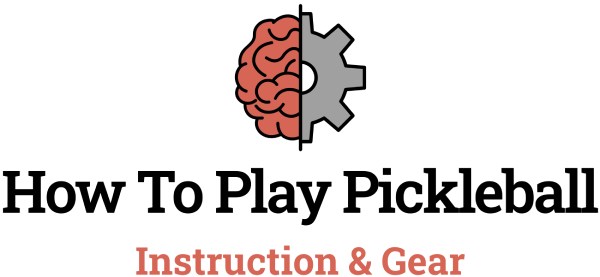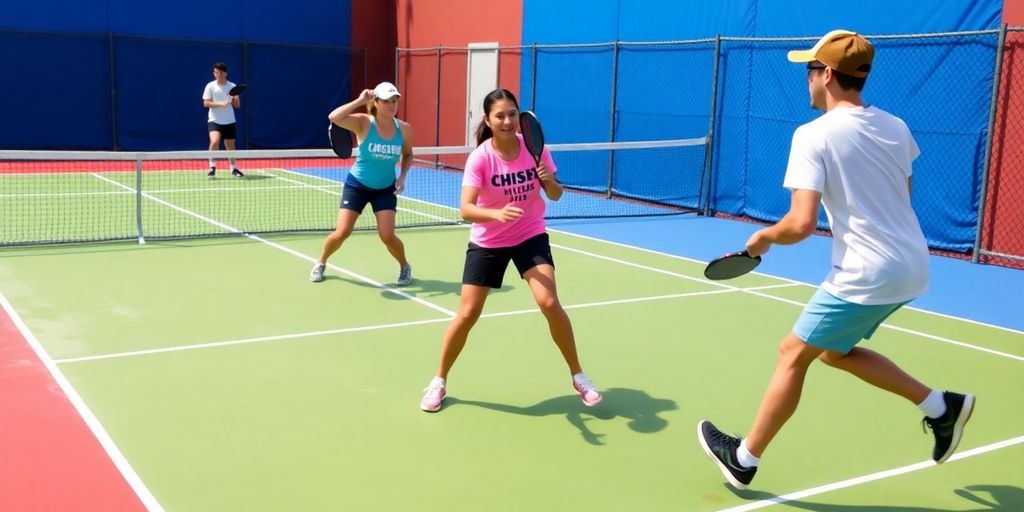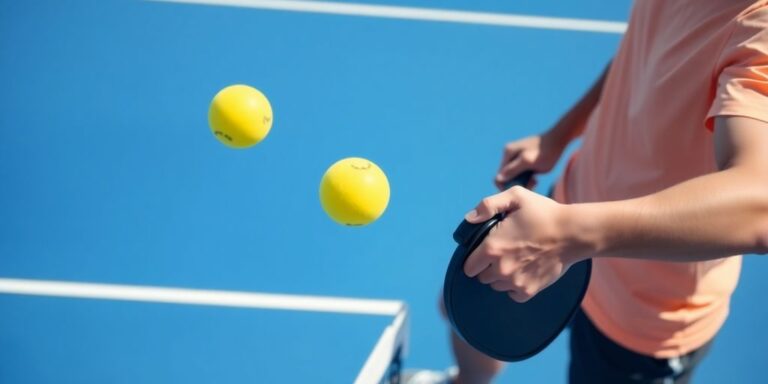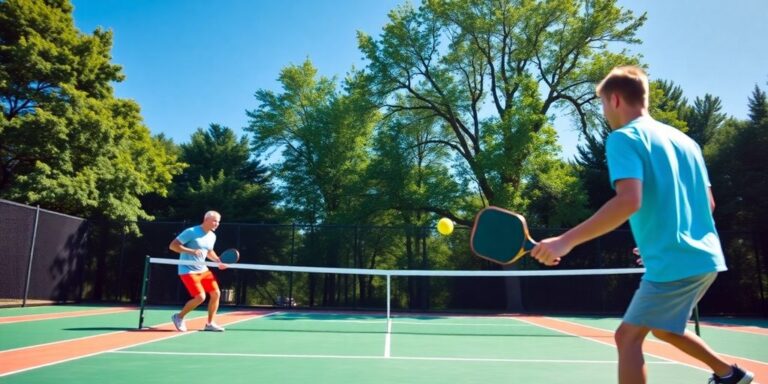Pickleball is taking the world by storm, and if you’re looking to up your game, you’ve come to the right place. This article is all about helping you become a winner on the pickleball court. We’re diving into the strategies, techniques, and mindsets that can set you apart from the competition. Whether you’re just starting out or you’ve been playing for a while, there’s always room to improve and have more fun while doing it. Let’s get started!
Key Takeaways
- Master the basic techniques like serving and dinking to gain an edge.
- Develop mental toughness to stay focused during intense matches.
- Understand the importance of court positioning and how it affects gameplay.
- Learn to analyze opponents and adapt your strategy on the fly.
- Avoid common mistakes such as overcommitting and poor communication in doubles.
Essential Techniques for Winning Pickleball
Mastering the Serve
Alright, let’s talk about serves in pickleball. If you’re looking to up your game, nailing the serve is a must. It’s the one shot you have complete control over, so make it count. Aim for a deep serve, ideally targeting your opponent’s backhand. This makes it tougher for them to return aggressively. Remember, in pickleball, you’ve only got one shot at the serve, so precision is key. Spend time practicing different serve styles, like adding a bit of spin or varying the speed, to keep your opponents guessing.
Executing the Third Shot Drop
Next up is the third shot drop, and trust me, it’s a game-changer. After the serve and return, the third shot is where you can really set the tone. The goal here is to hit a soft shot that lands in your opponent’s non-volley zone, also known as "the kitchen." This shot gives you time to advance to the net and take control of the rally. Aim for your opponent’s backhand to make it even more challenging for them to return. It’s all about consistency and placement, so practice until you can do it in your sleep.
Utilizing Effective Dinks
Now, let’s dive into dinks. These are those soft, controlled shots that barely clear the net and land in the kitchen. Dinks are all about patience and precision. They’re not just defensive—they can set up offensive plays by forcing your opponent to pop the ball up. When dinking, stay low and focus on control rather than power. Mix up your shots by varying the angle and speed to keep your opponent on their toes. A good dink game can frustrate your opponents and create opportunities to win points.
Mental Strategies for Winning Pickleball
Building Mental Toughness
In pickleball, mental toughness is your secret weapon. It’s what keeps you cool when the game heats up. To build this, you need to practice staying calm and focused, even when things aren’t going your way. A strong mental game lets you bounce back from setbacks and keep your head in the match. Try releasing tension with simple actions like clapping your hands or tapping your paddle. These small habits can ground you and help you reset your mindset.
Developing a Game Plan
Having a game plan is like having a map for your match. It helps you know what to do when you’re out there on the court. Your plan should be based on your opponent’s strengths and weaknesses. If they’re strong at the net, maybe you focus on lobs and drop shots. If they have a weak backhand, aim for that. Always be ready to adjust your plan as the game unfolds.
Adapting During Matches
Adaptability is key in pickleball. What works in one game might not work in another. Be prepared to switch strategies mid-match if needed. Maybe you start with a soft game, but if your opponent is handling it well, you might need to bring more power into your shots. Communication is crucial, especially in doubles. Talk with your partner and make sure you’re both on the same page about any strategic changes.
Court Positioning and Movement in Winning Pickleball

Importance of Court Positioning
Getting your court positioning right can make or break your game. It’s not just about where you stand, but how you move. Good positioning helps you switch between offense and defense smoothly, giving you the upper hand. Here’s why it matters:
- Showcase Strengths: When you’re in the right spot, you can play to your strengths and hide your weaknesses.
- Reduce Errors: Proper positioning cuts down on mistakes, keeping you in control.
- Increase Shot Options: More options mean more ways to outsmart your opponent.
- Maximize Returns: Being in the right place helps you return the ball effectively.
Think of court positioning like a chess game. It’s all about anticipating and being ready, not just reacting.
Strategies for Effective Movement
Your movement on the court is crucial. It’s not just about speed but being smart with your moves. Here are some tips:
- Footwork Drills: Practice quick, controlled footwork to boost your agility and balance.
- Stay Low: Keep a low, athletic stance with bent knees, ready to move in any direction.
- Use Split-Steps: Master these for quick lateral moves and closing in on the net.
- Read the Game: Watch your opponents closely to anticipate their shots and adjust your position.
- Switching Gears: Be prepared to transition from defense to offense swiftly.
Communication in Doubles Play
Playing doubles is all about teamwork. Communication is key to ensure you and your partner are on the same page:
- Talk Constantly: Keep the dialogue going to avoid confusion and missed opportunities.
- Cover the Court: Decide who covers what areas to maximize court coverage.
- Signal Moves: Use signals or short phrases to indicate your moves or strategies.
By focusing on maximizing your pickleball space, you’ll enhance gameplay and improve overall performance. Remember, good communication and strategic positioning are your best allies on the court.
Analyzing Opponents for Winning Pickleball
Identifying Strengths and Weaknesses
When stepping onto the pickleball court, it’s not just about your skills; understanding your opponent’s game can be a game-changer. Start by observing their footwork and shot responses. Do they favor their forehand or backhand? Are they quick on their feet, or do they struggle with mobility? Take note of these elements during warm-ups or early in the match. This insight allows you to tailor your strategy to exploit their weaknesses while playing to your strengths.
Exploiting Opponent’s Weaknesses
Once you’ve identified your opponent’s weak spots, it’s time to capitalize on them. If they have a weak backhand, aim your shots there consistently. Are they uncomfortable with high lobs? Mix in a few to test their overheads. You can also use deceptive spins to keep them guessing. Remember, the goal is to make them play out of their comfort zone, forcing errors and gaining the upper hand.
Adjusting Strategies Mid-Game
Even the best-laid plans need tweaks. If your initial strategy isn’t working, don’t hesitate to change tactics. Maybe your opponent has adjusted to your game, or perhaps you’ve underestimated their skills. Stay flexible and ready to adapt. Consider shifting your focus from power shots to strategic placement or altering your serve to disrupt their rhythm. By staying alert and responsive, you can maintain control and steer the match in your favor.
In pickleball, the ability to adjust and adapt is as crucial as your physical skills. Observing your opponent closely and remaining flexible in your strategy can often be the key to consistent success on the court.
Common Mistakes to Avoid in Winning Pickleball
Overcommitting to Shots
One of the major pitfalls in pickleball is overcommitting to shots. Players often get caught up in the heat of the moment, swinging with all their might at every ball. This approach might work sometimes, but it’s not a reliable strategy. Pickleball is more about precision and control than raw power. Try to vary your shots, mixing in soft dinks and strategic placements to keep your opponent guessing.
Neglecting Court Positioning
Court positioning is crucial in pickleball. Many players make the mistake of staying in the "no-man’s-land"—the area between the kitchen line and the baseline. This spot is too far from the net to effectively volley and too close to make solid groundstrokes. Instead, aim to move quickly to the kitchen line after serving or returning, where you can take control of the point.
"Always be aware of your position on the court. It’s not just about where you are, but where you need to be next."
Failing to Communicate in Doubles
In doubles play, communication is key. Without clear and constant communication, players can end up going for the same ball or leaving gaps in their defense. Establish a system with your partner—decide who takes the middle shots and how you’ll cover the court. Simple phrases like "mine" or "yours" can make a big difference.
- Discuss strategies before the match. Plan who will cover which areas and how you’ll handle specific plays.
- Use hand signals or verbal cues. These can be especially helpful in noisy environments.
- Regularly check in with your partner. After each point, take a moment to adjust your strategy if needed.
By avoiding these common mistakes, you’ll find your game improving and, more importantly, your enjoyment of the sport increasing. Remember, engaging with the pickleball community can also offer valuable insights and tips to refine your skills.
Building a Winning Pickleball Mindset

Staying Patient and Focused
In pickleball, patience isn’t just a virtue—it’s a game-changer. The player who remains patient often comes out on top. It’s about waiting for the right moment to strike and not rushing into shots that aren’t there. Focus on letting the point develop naturally. In many cases, the player who speeds up the game prematurely ends up losing the point. So, keep calm, stay patient, and wait for the opportune moment to attack.
Embracing a Positive Attitude
Your mindset on the court can make or break your game. A positive attitude helps you shake off mistakes and keep your head in the game. When things don’t go your way, instead of getting frustrated, see it as a chance to learn. Celebrate small victories and use them to build confidence. Remember, a smile can be just as powerful as a winning shot.
Learning from Each Match
Every match is a learning opportunity. Whether you win or lose, there’s always something to take away. After each game, reflect on what went well and what could be improved. Consider keeping a journal to track your progress and identify patterns in your play. This way, you can make informed adjustments and continue to grow as a player. By learning from each match, you can develop a winning mindset that enhances your performance on the court.
To truly excel in pickleball, you need the right mindset. Embrace challenges, learn from your mistakes, and stay positive on the court. Ready to take your game to the next level? Visit Nunnery’s Pickleball Lab for expert tips and support!
Conclusion
So, there you have it! Whether you’re just starting out or have been playing for a while, having a game plan in pickleball is key. It’s not just about hitting the ball; it’s about knowing when and where to hit it. By focusing on strategies and practicing regularly, you can outsmart opponents and enjoy the game even more. Remember, it’s all about having fun while improving your skills. Keep these tips in mind, and you’ll be on your way to becoming a pickleball pro in no time!
Frequently Asked Questions
What is the best way to serve in pickleball?
The best way to serve in pickleball is to aim deep and to your opponent’s backhand. This makes it harder for them to return the ball with power.
How can I improve my pickleball game strategy?
To improve your pickleball strategy, focus on understanding your opponent’s weaknesses and playing to your strengths. Practice different shots like dinks and drop shots.
What should I do if my opponent is really strong?
If your opponent is strong, try to control the game by keeping the ball low and forcing them to make mistakes. Use strategic shots to disrupt their rhythm.
Why is communication important in doubles pickleball?
Communication in doubles is key to ensure both players know who will take each shot. It helps in covering the court effectively and avoiding confusion.
How do I stay mentally tough during a match?
Stay mentally tough by focusing on each point as it comes, not getting discouraged by mistakes, and keeping a positive attitude throughout the match.
What are common mistakes to avoid in pickleball?
Common mistakes include overcommitting to shots, neglecting court positioning, and failing to communicate with your partner in doubles play.




